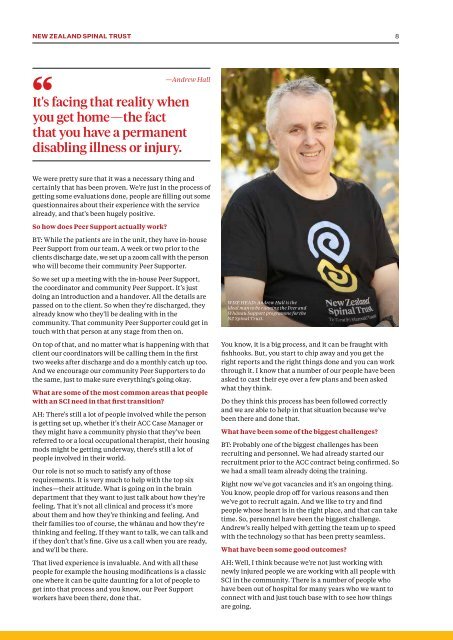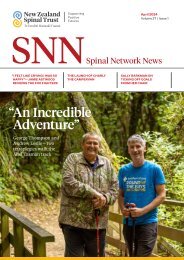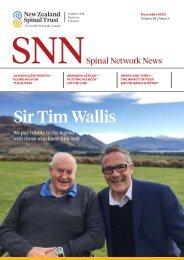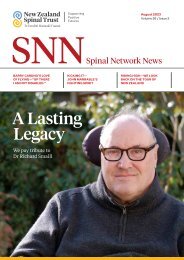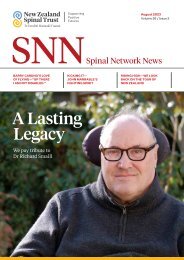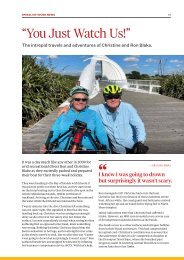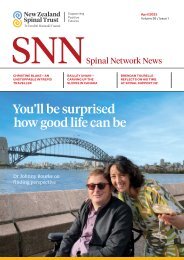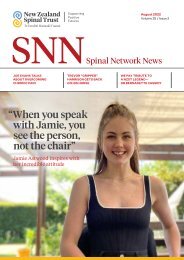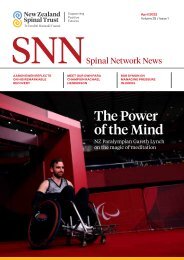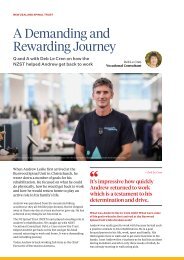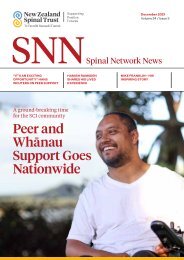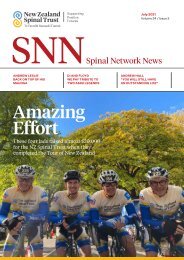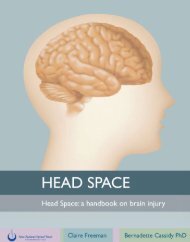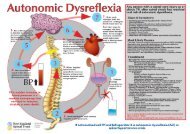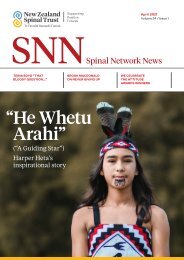SNN_December 2022 Issue_web low res
Create successful ePaper yourself
Turn your PDF publications into a flip-book with our unique Google optimized e-Paper software.
NEW ZEALAND SPINAL TRUST 8<br />
—Andrew Hall<br />
It's facing that reality when<br />
you get home—the fact<br />
that you have a permanent<br />
disabling illness or injury.<br />
We were pretty sure that it was a necessary thing and<br />
certainly that has been proven. We're just in the process of<br />
getting some evaluations done, people are filling out some<br />
questionnai<strong>res</strong> about their experience with the service<br />
already, and that's been hugely positive.<br />
So how does Peer Support actually work?<br />
BT: While the patients are in the unit, they have in-house<br />
Peer Support from our team. A week or two prior to the<br />
clients discharge date, we set up a zoom call with the person<br />
who will become their community Peer Supporter.<br />
So we set up a meeting with the in-house Peer Support,<br />
the coordinator and community Peer Support. It’s just<br />
doing an introduction and a handover. All the details are<br />
passed on to the client. So when they're discharged, they<br />
already know who they'll be dealing with in the<br />
community. That community Peer Supporter could get in<br />
touch with that person at any stage from then on.<br />
On top of that, and no matter what is happening with that<br />
client our coordinators will be calling them in the first<br />
two weeks after discharge and do a monthly catch up too.<br />
And we encourage our community Peer Supporters to do<br />
the same, just to make sure everything's going okay.<br />
What are some of the most common areas that people<br />
with an SCI need in that first transition?<br />
AH: There's still a lot of people involved while the person<br />
is getting set up, whether it's their ACC Case Manager or<br />
they might have a community physio that they've been<br />
referred to or a local occupational therapist, their housing<br />
mods might be getting underway, there's still a lot of<br />
people involved in their world.<br />
Our role is not so much to satisfy any of those<br />
requirements. It is very much to help with the top six<br />
inches—their attitude. What is going on in the brain<br />
department that they want to just talk about how they're<br />
feeling. That it's not all clinical and process it's more<br />
about them and how they're thinking and feeling. And<br />
their families too of course, the whānau and how they're<br />
thinking and feeling. If they want to talk, we can talk and<br />
if they don’t that’s fine. Give us a call when you are ready,<br />
and we'll be there.<br />
That lived experience is invaluable. And with all these<br />
people for example the housing modifications is a classic<br />
one where it can be quite daunting for a lot of people to<br />
get into that process and you know, our Peer Support<br />
workers have been there, done that.<br />
WISE HEAD: Andrew Hall is the<br />
ideal man to be running the Peer and<br />
Whānau Support programme for the<br />
NZ Spinal Trust.<br />
You know, it is a big process, and it can be fraught with<br />
fishhooks. But, you start to chip away and you get the<br />
right reports and the right things done and you can work<br />
through it. I know that a number of our people have been<br />
asked to cast their eye over a few plans and been asked<br />
what they think.<br />
Do they think this process has been fol<strong>low</strong>ed correctly<br />
and we are able to help in that situation because we've<br />
been there and done that.<br />
What have been some of the biggest challenges?<br />
BT: Probably one of the biggest challenges has been<br />
recruiting and personnel. We had already started our<br />
recruitment prior to the ACC contract being confirmed. So<br />
we had a small team already doing the training.<br />
Right now we've got vacancies and it's an ongoing thing.<br />
You know, people drop off for various reasons and then<br />
we've got to recruit again. And we like to try and find<br />
people whose heart is in the right place, and that can take<br />
time. So, personnel have been the biggest challenge.<br />
Andrew's really helped with getting the team up to speed<br />
with the technology so that has been pretty seamless.<br />
What have been some good outcomes?<br />
AH: Well, I think because we're not just working with<br />
newly injured people we are working with all people with<br />
SCI in the community. There is a number of people who<br />
have been out of hospital for many years who we want to<br />
connect with and just touch base with to see how things<br />
are going.


